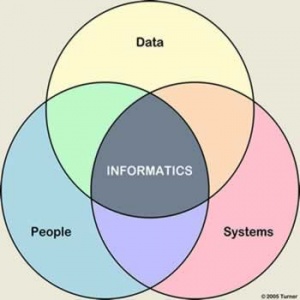Difference between revisions of "Informatics"
(→Branches) |
(→Business Informatics) |
||
| Line 11: | Line 11: | ||
===Business Informatics=== | ===Business Informatics=== | ||
| − | Business informatics is an emerging field that merges different aspects of business management, informatics, and information technology. The main goal of business informatics is to fully unite computer science and business administration in one field. | + | Business informatics is an emerging field that merges different aspects of business management, informatics, and information technology. The main goal of business informatics is to fully unite computer science and business administration in one field. Thus, the dream of business informatics is to combine the use of information technology and the older techniques of business in order to create an information system capable of tackling major problems. The hope is to destroy the bridge between the users and creators of technology, thus that all users will have an understanding of the underlying workings of technology.<ref>http://www.virtualinformatics.com/content/Business_informatics.htm</ref> |
| + | |||
===Social Computing=== | ===Social Computing=== | ||
Social computing -- including online communities, social networking, and user contributed content -- is the force behind Web 2.0 applications. SI faculty have invented and analyzed many of the underlying techniques that have powered the rise of social computing, including recommender systems, reputation systems, prediction markets, social network analysis, online communities, and computer-supported cooperative work. | Social computing -- including online communities, social networking, and user contributed content -- is the force behind Web 2.0 applications. SI faculty have invented and analyzed many of the underlying techniques that have powered the rise of social computing, including recommender systems, reputation systems, prediction markets, social network analysis, online communities, and computer-supported cooperative work. | ||
Revision as of 19:34, 4 December 2011
Informatics is a interdisciplinary major offered at the University of Michigan[1]. Informatics at University of Michigan is a relatively new major for undergraduate students. The undergraduate major for informatics was launched in 2008. However, the graduate program for informatics has been around since 1969. Informatics combines computer science, human-computer interaction, and the organization and structure of information sciences. Informatics looks at the design of technology beyond the technical structure. This major is more commonly known around Europe and gradually growing in North America. Students studying informatics learn the representation, processing and communication in natural and artificial systems, including Emerging Media, Avatars, and Cloud Computing. An Informatics degree is valuable in the flexibility it gives its graduates. Many Informatics majors have the opportunity to work in careers such as Engineering, Analytics, Consulting, Management, Statistics, and many more. Those Informatics graduates who choose to continue their education upon graduation tend to go to Law School, Business School, Medicine, Statistics, Information sciences and others.Contents
Branches
Bioinformatics
Using artificial information systems, scientists have made great progress in identifying core components of organisms and ecosystems and are beginning to better understand how these components behave and interact with each other. In fact, biology has become an information science, as computational techniques have become an important means to develop and evaluate biological hypotheses. Informatics is used from basic biological research-studying how patterns of gene expression differ across various cell types-to the practice of medicine, where informatics is used to compare treatments, to identify social correlates of health, and to evaluate possible changes in health policy. The Life Science Informatics track prepares students for careers and advanced study in a number of information-related fields in the life sciences, as well as medical school and other areas of graduate study.[2]
Geoinformatics
Geoinformatics is a multidisciplinary study further bridging the gap between physical science and computational science. Geoinformatics is the science and technologies which develops and uses information science infrastructure to address the problem of geography, geosciences and related branches of engineering.[3] Some example projects can include the incorporation of global positioning systems into more devices for better end-user usability. Also, studying the coastlines of countries to try and better prepare residents for hurricanes or other weather phenomena. One major company that specializes in the field of geoinformatics is ESRI. The approach is that geographic information systems (GIS) can help to address social, economic, business, and environmental concerns at all levels.[4]
Business Informatics
Business informatics is an emerging field that merges different aspects of business management, informatics, and information technology. The main goal of business informatics is to fully unite computer science and business administration in one field. Thus, the dream of business informatics is to combine the use of information technology and the older techniques of business in order to create an information system capable of tackling major problems. The hope is to destroy the bridge between the users and creators of technology, thus that all users will have an understanding of the underlying workings of technology.[5]
Social Computing
Social computing -- including online communities, social networking, and user contributed content -- is the force behind Web 2.0 applications. SI faculty have invented and analyzed many of the underlying techniques that have powered the rise of social computing, including recommender systems, reputation systems, prediction markets, social network analysis, online communities, and computer-supported cooperative work.
Students specializing in SC learn to analyze online social interactions, both in online communities and in more diffuse social networks. They learn about features of social computing technologies and gain skills in developing social computing applications.[6]
Undergraduate Programs
- Columbia University
- Indiana University
- Northern Kentucky University
- SUNY University at Albany
- SUNY University at Buffalo
- University of California, Irvine
- University of Illinois
- University of Michigan
- University of Nevada, Las Vegas
- University of Washington
- Vanderbilt University
Related Courses
- Statistics
- Mathematics
- Computer Science
- Ethics
- Social Psychology

